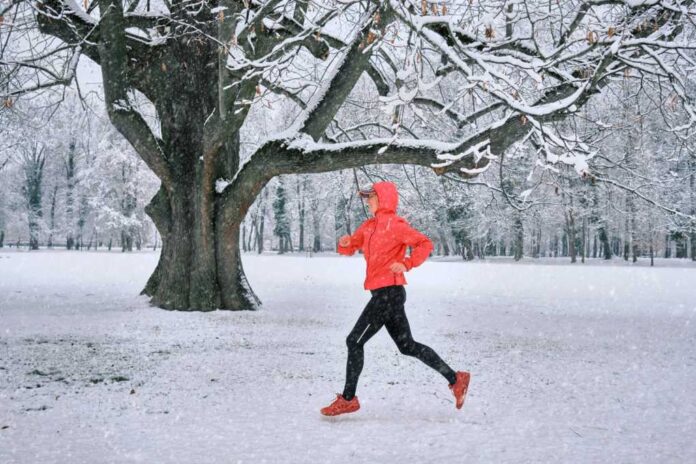
It can be tempting to curl up under a blanket and hibernate until springtime in the winter.
Another way to stay warm is to get moving.
Many people use the winter season as an excuse to skip their workout routine, but running in cold weather can be a challenging but empowering experience. If you can embrace this time of year, you might be surprised at how refreshing it can be.
Be realistic about what you can handle. Hypothermia and frostbite are possible and even likely if you’re not adequately prepared, especially if it is wet or windy.
Cold weather can make trails icy, slippery, and muddy. This makes it easy to fall and injure yourself.
If you think it’s unsafe, don’t risk it.
How To Dress For Winter Running
You’ll learn better strategies to keep yourself safe and comfortable while running in the cold with practice.
One common mistake many people make when they first start running outdoors in the winter is dressing too warmly. They bundle themselves up in many layers, then they get sweaty, and the sweat makes them even colder.
Experienced cold-weather runners understand that it’s better to be cold at the beginning of the workout and let the exercise warm them up.
- Avoid cotton materials that will absorb and hold water or sweat.
- Start with a layer of wicking material that will pull the sweat away from your skin.
- Add a layer of insulating fleece or wool, but not so thick and warm that it increases sweating.
- Use bright and reflective waterproof material on top to stay dry and be seen.
- Socks should keep your feet warm but not sweat excessively.
- Wear shoes that fit comfortably with these socks and have good treading.
- Wear a cap or headband to keep your ears and head warm and keep the sweat off your face.
- Keep your hands and fingers warm with gloves or mittens.
- You can protect your face with a face mask or scarf, but make sure you can still breathe fully.
Protect yourself from the sun, too. Even though it’s cold and might be cloudy, the sun’s UV rays can still cause sunburn. You may even want to wear sunglasses if it is too bright to see safely. Sunlight can reflect snow and ice, making it even more dangerous.
Always Stay Safe
Cold weather can affect your blood pressure, so talk to your doctor first if you have a heart condition.
Know your limits, and don’t push yourself too far. Listen to your body’s signals.
Have a plan for what you will do if you feel like you are getting cold or your clothes get wet.
Don’t run far away from home or possible shelter. Stay close to places where you can go inside and warm up if you need to.
Bring your fully charged phone with you, and tell someone where you’re running.
If something goes wrong, don’t try to be a hero. Be realistic and safe.






















